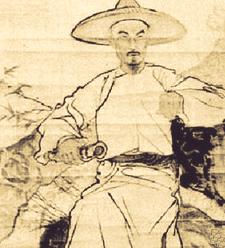Wu Jingzi: Difference between revisions
m →Biography: Journal cites (JSTOR link cleanup):, using AWB (7676) |
xs |
||
| Line 37: | Line 37: | ||
{{China-writer-stub}} |
{{China-writer-stub}} |
||
[[cs:Wu Ťing-c]] |
|||
[[de:Wu Jingzi]] |
[[de:Wu Jingzi]] |
||
[[es:Wu Jingzi]] |
[[es:Wu Jingzi]] |
||
Revision as of 20:40, 10 October 2011
| Wu Jingzi | |||||||
|---|---|---|---|---|---|---|---|
 | |||||||
| Traditional Chinese | 吳敬梓 | ||||||
| Simplified Chinese | 吴敬梓 | ||||||
| |||||||
Wu Jingzi (simplified Chinese: 吴敬梓; traditional Chinese: 吳敬梓; pinyin: Wú Jìngzǐ; Wade–Giles: Wu Ching-tse, 1701—January 11, 1754) was a Chinese scholar and writer who was born in the city now known as Chuzhou, Anhui and who died in Yangzhou, Jiangsu.
Biography
Wu was born into a well-to-do family, his father Wu Linqi (吳霖起) was a Qing official, but met no success himself. He attempted the Jinshi examination, but placed only at the county level. Poverty stricken by the age of thirty-two, he moved to Nanjing, where he met and acquainted himself with many government officials.
Wu's family may have had ties to the famous philosophers Yan Yuan (颜元) and Li Gong (李塨). The philosophers emphasized the importance of ritual in Neo-Confucianism and may have influenced Wu's novel.[1]
While in Nanjing, in 1740, he started his famous novel Rulin Waishi. There is a museum in his honor located in his hometown of Quanjiao county, now Chuzhou.
Notes
- ^ Ellen Widmer; Roddy, Stephen J. (1999). "Review of Literati Identity and Its Fictional Representations in Late Imperial China". Harvard Journal of Asiatic Studies. 59 (1). Harvard Journal of Asiatic Studies, Vol. 59, No. 1: 290–300. doi:10.2307/2652696. JSTOR 2652696.
References
- Encyclopædia Britannica 2005 Ultimate Reference Suite DVD, article- "Wu Ching-tzu"
- He, Manzi, "Rulin Waishi" ("The Scholars"). Encyclopedia of China, 1st ed.
- Paul S. Ropp, Dissent in Early Modern China: Ju-Lin Wai-Shih and Ch'ing Social Criticism (Ann Arbor: University of Michigan Press, 1981).